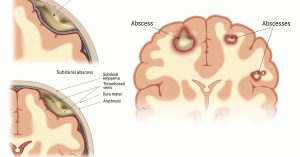A brain abscess is a serious condition characterized by a pus-filled swelling in the brain. Here are some key points about brain abscesses:

- Causes:
- Brain abscesses usually occur due to bacterial infection. Fungal brain abscesses are more common in people with weakened immune systems.
- Infections from other parts of the body can lead to brain abscesses. Common sources include heart and lung infections, ear or sinus infections, and even abscessed teeth.
- Risk factors include compromised immune systems (e.g., HIV/AIDS), cancer, chronic illnesses, congenital heart disease, head injuries, and meningitis.
- Symptoms:
- Symptoms may develop slowly over weeks or suddenly.
- Watch for differences in mental processes (confusion, decreased responsiveness, irritability), speech changes, decreased sensation, vision changes, personality or behavior changes, vomiting, fever, chills, neck stiffness, and sensitivity to light.
- In babies and young children, symptoms may include swollen or bulging fontanelle (soft spot on the head), projectile vomiting, and limb spasticity…
- Diagnosis:
- Brain abscess symptoms can resemble other diseases, so it’s crucial to seek medical attention promptly.
- Neurological exams, CT scans, and MRI scans help diagnose brain abscesses.
- In some cases, a lumbar puncture (spinal tap) may be necessary.
Remember, brain abscesses are life-threatening and require immediate medical evaluation and treatment. If you suspect a brain abscess, seek professional help promptly.
Treatment:
- Surgery: Most patients with brain abscess require surgical drainage, in addition to antibiotics, for both diagnostic and therapeutic purposes. A neurosurgeon should be contacted at the time of initial diagnosis. Needle aspiration or surgical excision is performed to identify the causative pathogen and reduce the size of the collection. Aspirate cultures are essential to identify aerobes, anaerobes, fungi, and Mycobacterium tuberculosis.
- Antibiotics: Wide-spectrum antibiotics are prescribed immediately to combat the infection. Fungal brain abscesses may require antifungal medications.
Remember, if you suspect a brain abscess, seek immediate medical attention.



